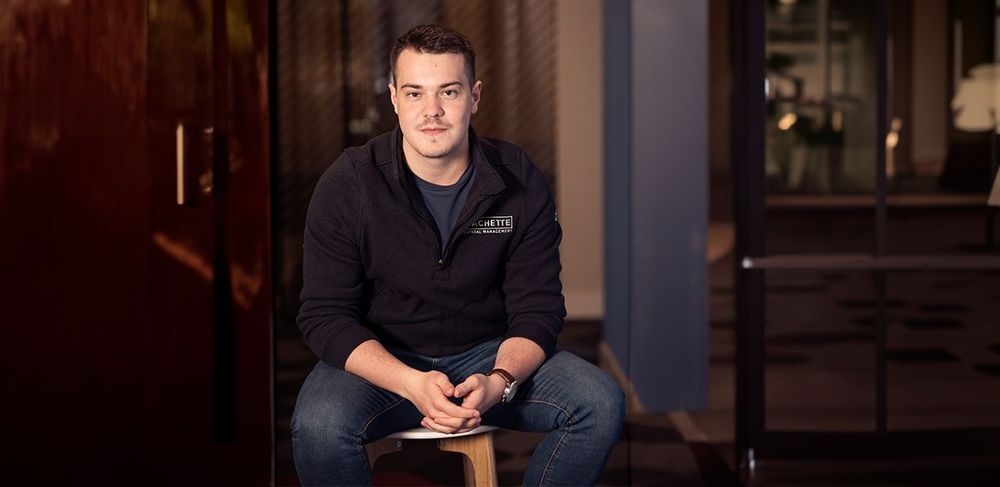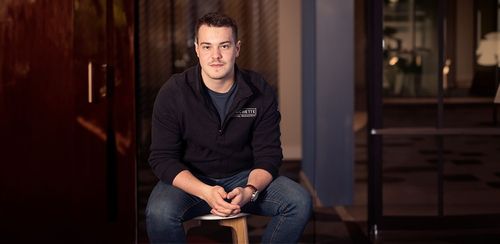

George Moroianu (Flip): from start-up to eMag investment

08 April, 2024
Share this article
Table of Contents
We see TV ads promoting Flip.ro, where you can buy or sell second-hand phones. Flip, a regional business part of the eMag group, generated €60 million in revenue in 2023 with ambitions to become a major player in Europe.
Yet, few know it was founded by three young adults.
George Moroianu, co-founder and CEO, had already launched two companies by the age of 21. He now shares Flip's narrative, emphasizing its human-centric approach rather than mere statistics.
Although a recent market entrant, dozens have already rallied around Flip: from founders and employees to collaborators, partners, and investors. How many people are now part of Flip.ro?
Indeed, the company has garnered support over time, which we're deeply grateful for—it's what propelled our rapid expansion! Today, we're roughly 240 colleagues at Flip.
You're a business of trust: Flip.ro relies on buyers' trust in the product quality and sellers' trust in getting a fair price through you. How do you build and transfer this trust internally among colleagues?
When building a product category, it's not just about defining it but also about building trust in it. We're in the refurbished tech category, and we gain trust by ensuring:
- For buyers: products sold are of excellent quality. We achieve this by inspecting each product through 67 quality tests and reconditioning them to function like new. Additionally, we offer benefits similar to new product sales: 2-year warranty, 30-day return policy, next-day delivery, and delivery to easybox. All while saving up to 40% compared to new prices.
- For sellers: we ensure a straightforward selling process and prompt payment.
Read more: What does flexible working look like in a technology company in 2024?
How often do you work from the office versus remotely? How important is team togetherness, and how do you maintain connection beyond daily tasks?
We're flexible and work in a hybrid manner, with in-office versus remote days varying by department. We see advantages and challenges in both modes. For example, you might prefer working from home for prolonged focus periods but find it easier to discuss updates with the team in the office.
For a scale-up like Flip, being together in the office is crucial. Spontaneous brainstorming and idea-sharing moments are valuable and help us move quickly.
Read more: The best Cafés in Bucharest to work remotely
You mentioned in a TEDx talk that education shouldn't be about competition but about self-reflection. Have you instilled this mindset in the Flip.ro team? If so, how does it reflect in the organizational culture and team activities?
It's difficult to determine if we've successfully communicated this, but we definitely notice two aspects that bring us satisfaction:
- Firstly, we spend more time listening to our customers and improving for them than studying the competition. This doesn't mean we're not attentive to the market; we are. However, we believe competitive advantages come from staying close to customers and building based on their insights.
- Secondly, we have a transparent culture based on feedback. It's essential for me and the co-founders to have an environment where people feel comfortable sharing ideas. It's more important to reach the right conclusion together than for someone to win a discussion. Prioritizing the company's well-being allows us to help each other with honest feedback aimed at improvement.
It may not always be perfect, but it's a principle we adhere to and an exercise we work on to improve.
The journey from a small start-up to a stable organization seems long with constant internal realignments. How did you scale the business, and what challenges did you face? How many original team members stayed, and how many left along the way?
Each growth stage came with its own challenges. In the first year, challenges were more about the product and go-to-market strategy. As we grew, we focused more on the team, organization, culture, and long-term strategy.
For example, during the scale-up phase, transitioning from a team of generalists to specialists in each domain (e.g., finance, marketing, tech) was crucial to adopt best-in-class processes and methods.
Many early colleagues have stayed with us, and their roles and responsibilities changed as the company grew. This change wasn't natural for everyone, but it brought many lessons and satisfaction.
Read more: Perks and Benefits in 2023
How did the eMag acquisition impact the Flip.ro team, and what were the changes/challenges it brought?
The moment eMag became an investor was met with great enthusiasm by the team. We had laid the groundwork for something beautiful, but it was clear to all of us that we had a lot to learn from such a prominent eCommerce player. And that's exactly what happened. The challenges were more about rapidly adopting best practices and learning as entrepreneurs to manage the business through different growth and maturity stages.
In another interview, you mentioned that the people you start with are crucial. You want to work with people you trust. What do you look for when recruiting a new team member?
In addition to hard skills, we're very interested in soft skills, specifically how suitable we think the person will be in the organization. Some important aspects for us are:
- Results orientation - we like people motivated by the impact they make.
- Curiosity and interest in improving things for customers.
- Being a good team player - knowing when and how to give and receive feedback, and working well in a team.
Read more: How To Lead A Distributed Team
How important is it to follow your passion, and how many "no's" or "yes's" do you need to pursue goals further? How many "no's" did you encounter until Flip.ro took shape, and what made you not give up?
In business, at least, I don't believe so much in the idea of following your passion. Or at least I'm pretty sure it's not the only path to success. What if your passion lies in a "red ocean" market, with many competitors who have already successfully implemented your idea in various forms?
For us, the three Flip founders, the passion was more about building useful things, and we were attracted to the idea of starting a start-up. Of course, we happened to really like the industry and its challenges, but we didn't start this business because we were very passionate about electronics per se.
I think it's more important to do something that satisfies your curiosity and that you enjoy. As long as you fulfill these criteria, you'll have enough energy to overcome all the inevitable "no's."
Interviews
Keep up to date with our most recent articles, events and all that Pluria has to offer you.
By subscribing to the newsletter you agree with the privacy policy.
The way we work has suffered dramatic changes in the past several years and, as a consequence, so did employee perks and benefits. Thinking beyond the traditional benefits package has become a necessity for [...]
04 December, 2023

A paper published in 2020 by the Harvard Business Review stated that productivity is closely related to the way teams are managed by their leaders. And the pandemic challenged managers to develop leadership[...]
04 December, 2023

Personally, during these last years I’ve been working mainly remotely & hybrid. This experience has taught me to constantly look for new methods to manage the projects, to communicate with the teams inv[...]
11 December, 2023